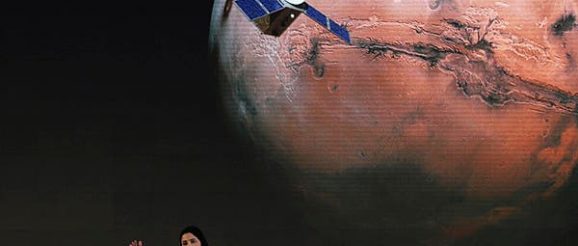UAE a ‘close ally’ for collaboration on space innovation: Israel aerospace chief

The United Arab Emirates is an ideal partner for collaboration on space innovation and exploration and can help drive Middle East progress into the solar system, a leading Israel aerospace chief told Al Arabiya English.
Colonel Shlomi Sudri, general manager of Israel Aerospace Industries’ Space Division, said, following the US-brokered Abraham Accords, the peace deal has paved the way for collaboration in science, technology – and now space.
For all the latest headlines follow our Google News channel online or via the app.
“Dubai for us symbolizes technology and innovation on one side and on the other side international collaboration,” said Sudri, speaking to Al Arabiya English on the sidelines of the International Astronautical Congress in Dubai. “We come to Dubai to seek for international collaboration, because we think that both Israel and the UAE, are tech hubs and we are leading local and international technology.”
According to Sudri, Israel and the UAE working together can accelerate the technology and innovation in the region.
“I think that both of us are relatively small countries, but with big minds,” he said.
UAE and Israel space programs
Both nations are already known for their forays into space.
Israel has witnessed near-unprecedented developments in space research, advanced technologies and the expansion of its private sector in recent decades. Including becoming the eighth country in the world to successfully launch and position satellites in space.
The Emirates’ space program started in 2006 with a knowledge transfer program that saw Emirati engineers working with partners around the world to develop the UAE’s spacecraft design, engineering and manufacturing capabilities, launching a series of earth observation satellites designed and built by Emirati engineers.
The country has already marked many milestones in space with the UAE’s Hope Probe reaching the Red Planet in February – becoming only the fifth nation in history to do so.
The UAE has also recently announced that the country is setting a course for Venus and the main asteroid belt. The new interplanetary mission will launch in 2028 and will see the spacecraft go on a five-year expedition, orbiting Venus and Earth before reaching the main asteroid belt located between Mars and Jupiter in 2040.
UAE, Israel space agencies join forces
Earlier this week, the UAE Space Agency announced it is joining forces with the Israel Space Agency to boost cooperation in scientific research, space exploration and knowledge transfer.
It is the latest in a string of bilateral business agreements achieved between the two Middle East nations.
The UAE will exchange research and develop scientific instruments for Israel’s Beresheet-2 mission to land a spacecraft on the Moon by 2024 as part of the landmark agreement.
Beresheet 2, was first announced in late 2020 and plans to set new global space records through a double landing on the moon and the installment of the lightest ever moon landers, each weighing 60 kilograms (132 pounds) without fuel.
It will be composed of three spacecraft — an orbiter and two landers — with the mission hoping to follow China in becoming only the second to successfully land on the far side of the moon.
The orbiter, known as the mothership, is set to remain in space for years, serving as a platform for educational science activities through a remote connection that allows students from around the world to participate in deep-space research.
Under the new partnership, universities in Israel and the UAE will also launch collaborative research projects.
They include exploring red tide phenomenon, analyzing red palm weevil infestation which threatens date palm cultivation, and mapping aerosols – solid and liquid particles suspended in the atmosphere.
Vegetation and environmental data gathered by a microsatellite used by the Israel Space Agency and the French Space Agency will also be shared with the UAE.
Sudri told Al Arabiya English that many more collaborations in the space sector will follow.
“In our region, we used to call Israel the startup nation. And I think that, that we can call the UAE the startup Emirates. When you combine the startup nation with the startup Emirates, I think we can open the boundaries and do a very exciting things up in space.”
He said that the Israel Aerospace Industries hope to collaborate further with the UAE, especially in the field of next-generation satellite and communication systems and data sharing.
Israel, he said, is planning constellations of nano satellites allowing heightened coverage and communication in space.
This will mean “a lot of data going down to earth,” he said.
Jointly with the UAE, IAI could use and develop that data for innovation projects that would serve both nations, Sudri said.
“I think that the Abraham Accords agreement opened collaboration with the UAE,” said Sudri. “We need partners to play with and to bring new innovation solutions in the space sector which is an academic engine for so many things.”
“This will be a long-term relationship. I think. We are now seeing the seeds that will grow in the near- and long-term future.”
Read more:
UAE, Israel sign landmark agreement on space cooperation, planetary research
UAE ministers say space is a key sector for the future, launches new tech challenge
Expo 2020 Dubai’s ‘Space Week’ explores humanity’s relation with the final frontier
